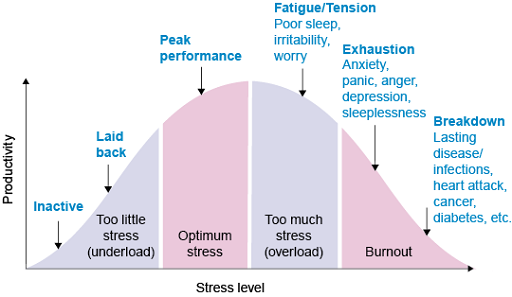3.1.1 Your physical wellbeing: signs of stress
The medical profession uses measures such as body mass index, blood pressure and cholesterol levels to determine physical wellbeing, but feeling physically well means different things to different people. If you have a long-term medical condition, for example, your personal sense of your physical wellbeing may differ from what’s considered medically ‘normal’.
As modern life has become more and more hectic, and the COVID-19 pandemic introduced a whole new set of things for us to worry about, we may have become used to feeling stressed nearly every day. A small amount of stress or anxiety might help us be more productive, according to what is known as the Yerkes–Dodson law, illustrated in Figure 5.
However, too much stress can have a negative impact on our health and productivity. These physical signs can be a useful indicator of whether you might be too stressed:
- Headaches – frequent/chronic headaches have been linked to high levels of stress, but other triggers for headaches include dehydration, lack of sleep or high alcohol consumption.
- Frequent illness – being stressed has a direct impact on the immune system, making you more vulnerable to infections, but your diet and physical activity level can also affect immunity.
- Low energy/fatigue – energy levels naturally vary throughout the day, but feeling like you’re constantly running on empty, to the extent that performing simple tasks is a challenge, could be a sign that you’re too stressed; however, insufficient sleep, dehydration, low blood sugar and anaemia are also factors that affect energy levels.
- Insomnia – trouble sleeping, because you can’t ‘switch off’ your mind or you’re tossing and turning at night, are classic indicators of high stress levels. Good sleeping habits are a key component of wellbeing and reduced sleep can also cause low energy and headaches and impact your immune system.
- Digestive issues – physical symptoms such as diarrhoea and constipation can manifest as a result of too much stress, or if you already live with Irritable Bowel Syndrome or Inflammatory Bowel Disease, stress can worsen your symptoms.
- Appetite – changes in appetite, whether that’s feeling more or less hungry than normal, could be a response to excessive stress.
Most people experience some level of stress in their daily lives, but it affects us in different ways. If you feel like you are too stressed, start by considering the source of that stress. If it’s work related, could you speak to your line manager about decreasing your workload? If your personal life is the issue, could you find some more time to look after yourself?
Simple self-care approaches to dealing with stress include meditation, breathing techniques, yoga and other mindfulness-based activities. Many organisations offer such activities to employees in a variety of online and offline formats – your Human Resources team should be able to point you towards these. However, if you are regularly experiencing the physical symptoms mentioned above, it’s also advisable to contact your GP or healthcare provider to clarify the cause of your symptoms as many of these can be signs of other underlying health issues, such as diabetes, nutritional deficiencies, the menopause, and discuss the best course of action.

